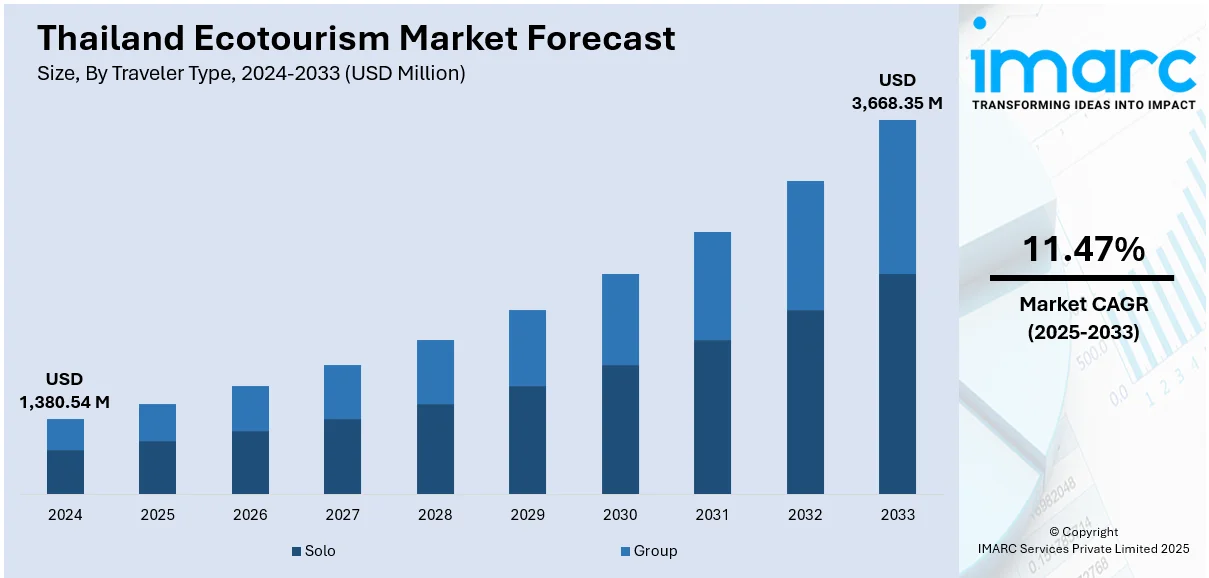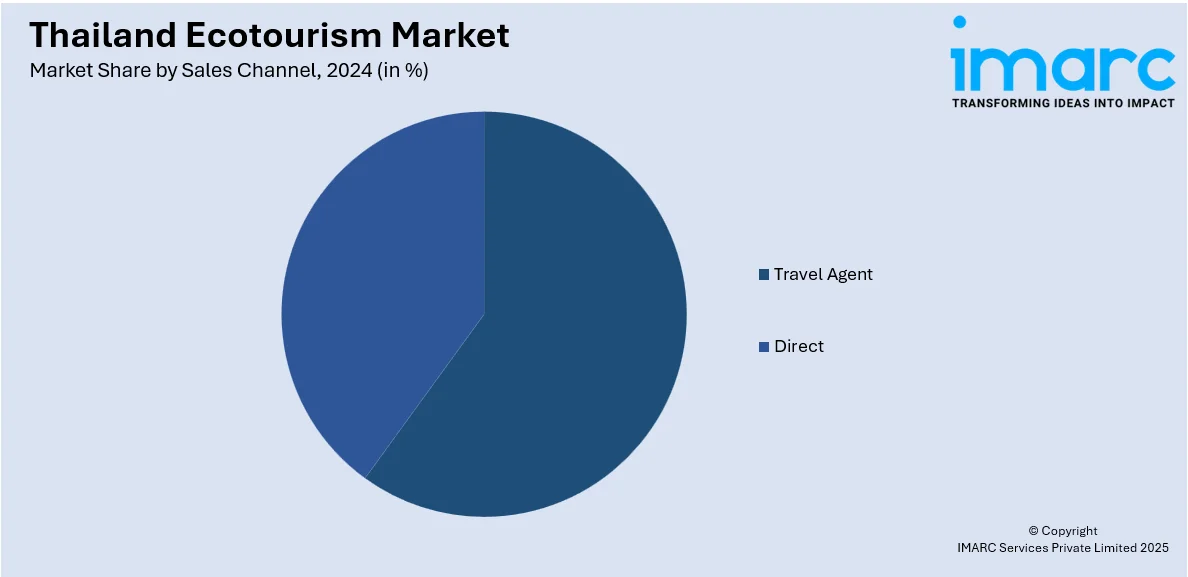
Thailand Ecotourism Market Size, Share, Trends and Forecast by Traveler Type, Age Group, Sales Channel, and Region, 2025-2033
Thailand Ecotourism Market Overview:
The Thailand ecotourism market size reached USD 1,380.54 Million in 2024. The market is projected to reach USD 3,668.35 Million by 2033, exhibiting a growth rate (CAGR) of 11.47% during 2025-2033. The market is propelled by the country's strong government initiatives promoting sustainable tourism under its Bio-Circular-Green (BCG) Economic Model. In addition to this, rising global and domestic demand for nature-based experiences is fueling the expansion of ecotourism activities in national parks, rural communities, and marine reserves. Additionally, investments in eco-friendly infrastructure, community-based tourism programs, and digital platforms to enhance accessibility are further augmenting the Thailand ecotourism market share.
|
Report Attribute
|
Key Statistics
|
|---|---|
|
Base Year
|
2024 |
|
Forecast Years
|
2025-2033
|
|
Historical Years
|
2019-2024
|
| Market Size in 2024 | USD 1,380.54 Million |
| Market Forecast in 2033 | USD 3,668.35 Million |
| Market Growth Rate 2025-2033 | 11.47% |
Thailand Ecotourism Market Trends:
Strengthening of Policy-Driven Sustainability Frameworks in Tourism Planning
Thailand is reinforcing its policy structures to instil sustainability values in national and regional ecotourism planning, reflecting the country's commitment towards reconciling the preservation of the environment with tourism development. In 2024, Thailand hosted more than 35.54 Million international tourists, a 26.27% surge from the year before. This expansion in tourist visits puts greater pressure on the nation's environmental and cultural resources, driving the government to step up the inclusion of sustainable policies in the tourism industry. Aligned with its climate neutrality target by 2050, Thailand is implementing regulatory measures that prioritize eco-conscious tourism development, such as visitor caps in ecologically sensitive zones, stricter environmental impact assessments, and incentives for green-certified operators. Additionally, the Department of National Parks and the Tourism Authority of Thailand (TAT) are working collaboratively to cap visitor numbers in fragile ecosystems, enforce wildlife protection laws, and encourage responsible behavior through educational campaigns. Moreover, regional zoning regulations are being refined to designate ecotourism corridors, restrict mass development, and mandate environmental impact assessments for tourism projects. Furthermore, technical and financial assistance is being provided to small and medium-sized tourism operators that meet eco-certification and sustainability criteria. These frameworks are enhancing regulatory monitoring while encouraging accountability among stakeholders along the value chain for tourism.

To get more information on this market, Request Sample
Development of Eco-Friendly Transport Facilities for Tourist Mobility
The expansion of eco-friendly transportation options is propelling the Thailand ecotourism market growth, driven by the need to reduce carbon emissions and improve access to remote natural areas. Moreover, authorities are increasingly supporting low-impact mobility systems, such as electric shuttle buses, bicycle-sharing programs, and solar-powered boats, particularly in ecotourism hotspots like Chiang Mai, Ayutthaya, and Koh Samui. For instance, the Bangkok Metropolitan Administration (BMA) announced the expansion of its "BMA Feeder" electric shuttle bus service with the addition of five new routes starting July 1, 2025. The initiative is designed to promote the use of public transport, reduce traffic congestion, and enhance air quality in the capital. Besides this, the Thai government has introduced pilot projects integrating electric vehicle (EV) infrastructure in national parks and heritage sites, allowing seamless and sustainable travel for domestic and international visitors. In addition to this, railway tourism is also gaining momentum, with refurbished scenic train routes offering an alternative to air travel, thereby aligning with Thailand's climate action goals. Furthermore, strategic partnerships between private transport operators and green-certified tour companies further encourage the adoption of hybrid or electric fleets in island transfers and eco-lodging pickups. These efforts collectively support the country's shift toward cleaner tourism practices while enhancing visitor experience through accessible, comfortable, and environmentally responsible transport options.
Thailand Ecotourism Market Segmentation:
IMARC Group provides an analysis of the key trends in each segment of the market, along with forecasts at the country and regional levels for 2025-2033. Our report has categorized the market based on traveler type, age group, and sales channel.
Traveler Type Insights:
- Solo
- Group
The report has provided a detailed breakup and analysis of the market based on the traveler type. This includes solo and group.
Age Group Insights:
- Generation X
- Generation Y
- Generation Z
A detailed breakup and analysis of the market based on the age group have also been provided in the report. This includes generation X, generation Y, and generation Z.
Sales Channel Insights:

- Travel Agent
- Direct
The report has provided a detailed breakup and analysis of the market based on the sales channel. This includes travel agent and direct.
Regional Insights:
- Bangkok
- Eastern
- Northeastern
- Southern
- Northern
- Others
The report has also provided a comprehensive analysis of all the major regional markets, which include Bangkok, Eastern, Northeastern, Southern, Northern, and others.
Competitive Landscape:
The market research report has also provided a comprehensive analysis of the competitive landscape. Competitive analysis such as market structure, key player positioning, top winning strategies, competitive dashboard, and company evaluation quadrant has been covered in the report. Also, detailed profiles of all major companies have been provided.
Thailand Ecotourism Market News:
- On April 23, 2025, Kaia announced the launch of its first eco-friendly luxury resort on Koh Phangan, Thailand, set to open by late 2025. The resort will feature 31 open-concept tented suites and four two-bedroom villas, all designed with sustainable materials such as upcycled teak and recycled plastics, along with solar-powered energy systems and a closed-loop food and waste model. The property will offer nature-immersive experiences including wellness sessions, chef-led foraging, and cultural workshops, with a strong focus on environmental stewardship and community engagement.
Thailand Ecotourism Market Report Coverage:
| Report Features | Details |
|---|---|
| Base Year of the Analysis | 2024 |
| Historical Period | 2019-2024 |
| Forecast Period | 2025-2033 |
| Units | Million USD |
| Scope of the Report |
Exploration of Historical Trends and Market Outlook, Industry Catalysts and Challenges, Segment-Wise Historical and Future Market Assessment:
|
| Traveler Types Covered | Solo, Group |
| Age Groups Covered | Generation X, Generation Y, Generation Z |
| Sales Channels Covered | Travel Agent, Direct |
| Regions Covered | Bangkok, Eastern, Northeastern, Southern, Northern, Others |
| Customization Scope | 10% Free Customization |
| Post-Sale Analyst Support | 10-12 Weeks |
| Delivery Format | PDF and Excel through Email (We can also provide the editable version of the report in PPT/Word format on special request) |
Key Questions Answered in This Report:
- How has the Thailand ecotourism market performed so far and how will it perform in the coming years?
- What is the breakup of the Thailand ecotourism market on the basis of traveler type?
- What is the breakup of the Thailand ecotourism market on the basis of age group?
- What is the breakup of the Thailand ecotourism market on the basis of sales channel?
- What is the breakup of the Thailand ecotourism market on the basis of region?
- What are the various stages in the value chain of the Thailand ecotourism market?
- What are the key driving factors and challenges in the Thailand ecotourism market?
- What is the structure of the Thailand ecotourism market and who are the key players?
- What is the degree of competition in the Thailand ecotourism market?
Key Benefits for Stakeholders:
- IMARC’s industry report offers a comprehensive quantitative analysis of various market segments, historical and current market trends, market forecasts, and dynamics of the Thailand ecotourism market from 2019-2033.
- The research report provides the latest information on the market drivers, challenges, and opportunities in the Thailand ecotourism market.
- Porter's five forces analysis assist stakeholders in assessing the impact of new entrants, competitive rivalry, supplier power, buyer power, and the threat of substitution. It helps stakeholders to analyze the level of competition within the Thailand ecotourism industry and its attractiveness.
- Competitive landscape allows stakeholders to understand their competitive environment and provides an insight into the current positions of key players in the market.
Need more help?
- Speak to our experienced analysts for insights on the current market scenarios.
- Include additional segments and countries to customize the report as per your requirement.
- Gain an unparalleled competitive advantage in your domain by understanding how to utilize the report and positively impacting your operations and revenue.
- For further assistance, please connect with our analysts.
 Request Customization
Request Customization
 Speak to an Analyst
Speak to an Analyst
 Request Brochure
Request Brochure
 Inquire Before Buying
Inquire Before Buying




.webp)




.webp)












